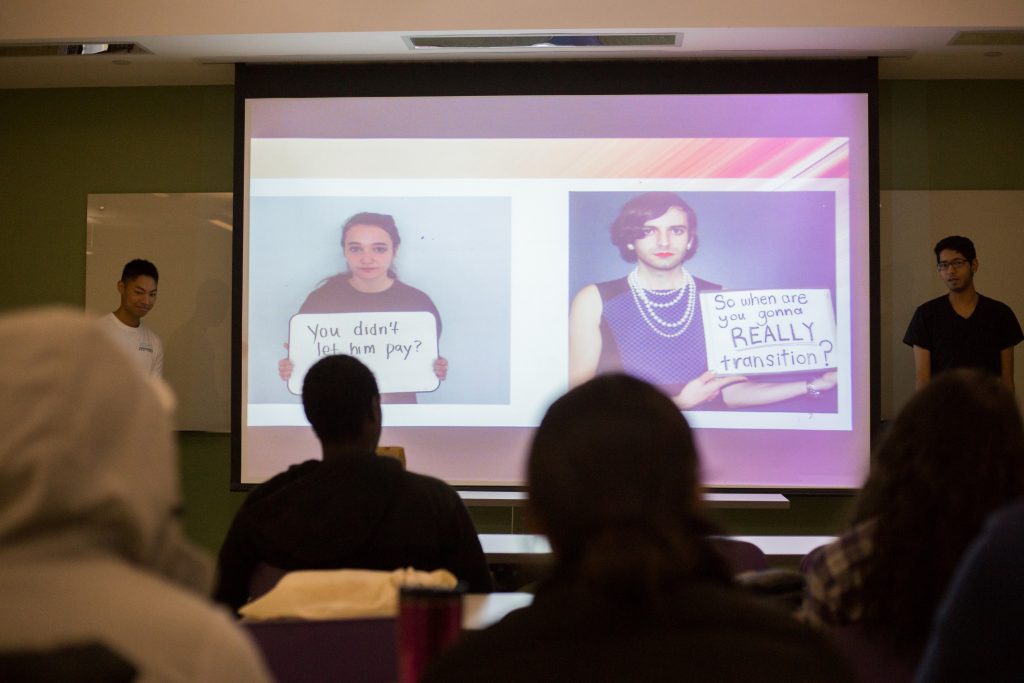
As a precursor to a larger event in the spring, the Binghamton Association of Mixed Students (BAMS) led a discussion on what microaggressions are, how to avoid using them and what to do when someone experiences them.
BAMS held the discussion in the University Union on Monday night, where Jerry Mathew, BAMS’ social liaison and a sophomore majoring in mechanical engineering, and Andrew Young, fundraising coordinator for BAMS and a sophomore majoring in systems science and industrial engineering, provided background on microaggressions in regard to race, gender, age and sexuality.
The event was intended to serve as a primer for “Diversity is Strength,” a larger event BAMS is planning to hold next semester.
At the discussion, Mathew and Young defined a microaggression as a verbal comment or a physical action, whether intentional or not, that sends a derogatory message to a person based upon the marginalized group they belong to. Young said there are three categories of microaggressions: microassault, microinsult and microinvalidation. Microassault refers to name-calling, whereas an example of a microinsult is an explicitly racist message. Microinvalidation pertains to purposely not acknowledging someone’s identity.
“Especially for microaggressions, the majority of times they happen every day without people realizing what they are,” Young said. “Microaggressions happen every day, but because everyone doesn’t [know] what microaggressions are, every comment comes off as unintentional. But once people learn what a microaggression is, they can either stop themselves or do it in a joking manner.”
After the presentation, attendants shared their own microaggression stories. Divine Alvarez, an undeclared freshman, talked about how college life and getting exposed to new cultures can make people more aware of others, preventing the use of microaggressions.
“It’s just good to be educated about things because not everyone is aware of the way these things can affect people,” Alvarez said. “So it’s nice, especially when you go to college and you’re around different types of people, to be aware that this type of stuff happens and how you can stop doing them and how you can handle them when they happen to you.”
Deana Moffat, president of BAMS and a junior majoring in biomedical engineering, said she wants to educate students to actively decrease microaggressions within the campus community.
“Binghamton [University]’s such a diverse group of students, and you don’t want to see a group of students who are all supposed to be so united and living together, working together, studying together, making each other feel upset through little tiny comments that can be avoided if possible,” Moffat said. “You basically just want to do your best to inform people how they can be good friends, good fellow active learners around one another, just all around make Binghamton a more inclusive and safe community to be a part of.”
In the past, BAMS has held larger microaggression-based events for people to learn about their inner prejudices and those that others may have. At the “Diversity is Strength” event, it plans to have guest speakers who will discuss microaggressions and also ask students about the microaggressions they’ve heard on campus.
Mathew said microaggressions should not be overlooked, as they often are, and that the discussion was intended to introduce people to ideas that will be expanded at the “Diversity is Strength” event.
“We’ve kind of been desensitized to the whole idea of microaggressions, and we’re desensitized to the point that even when you try to talk about it, people just laugh it off, think of it as a joke,” Mathew said. “That’s what the point of the later, big microaggression event is supposed to do. This is supposed to be kind of like a teaser, kind of tantalize you, kind of get a sense of what we are going to go into later on.”


